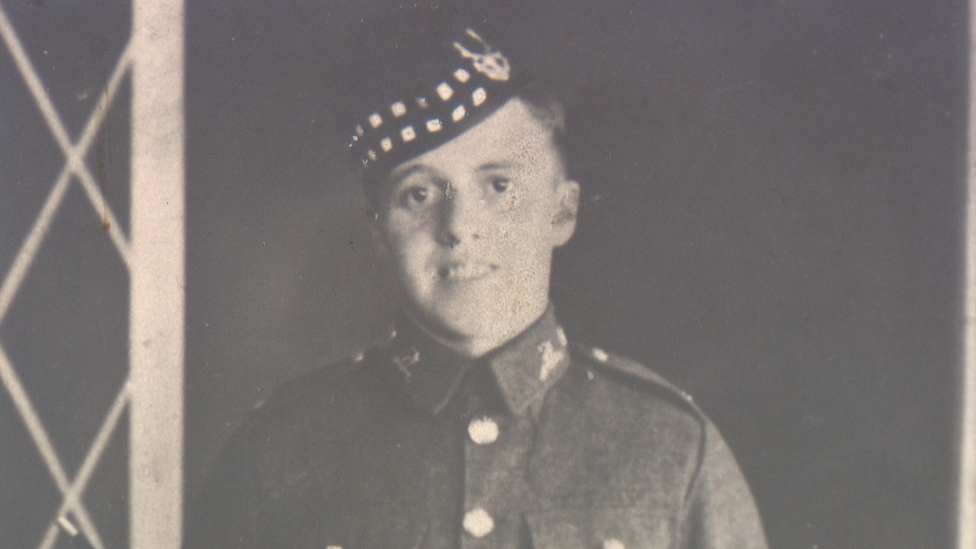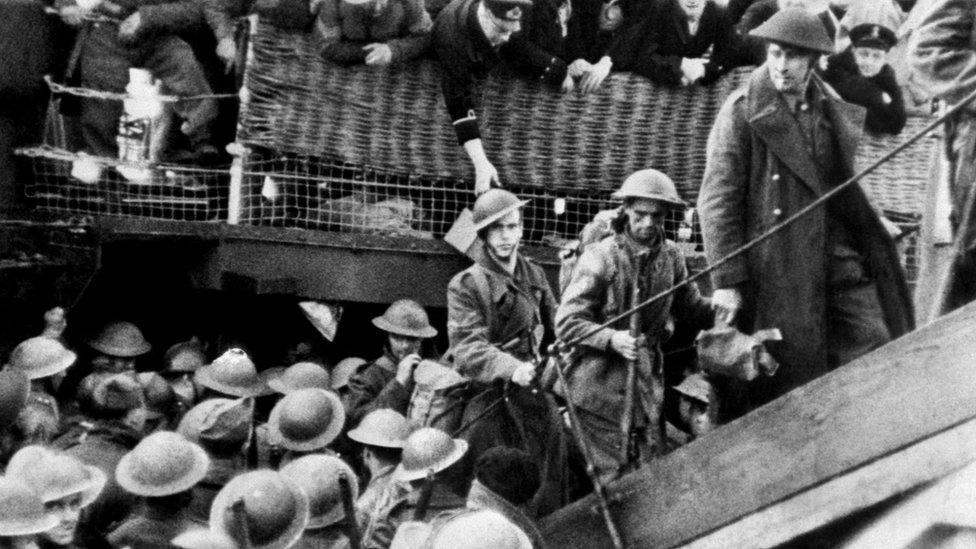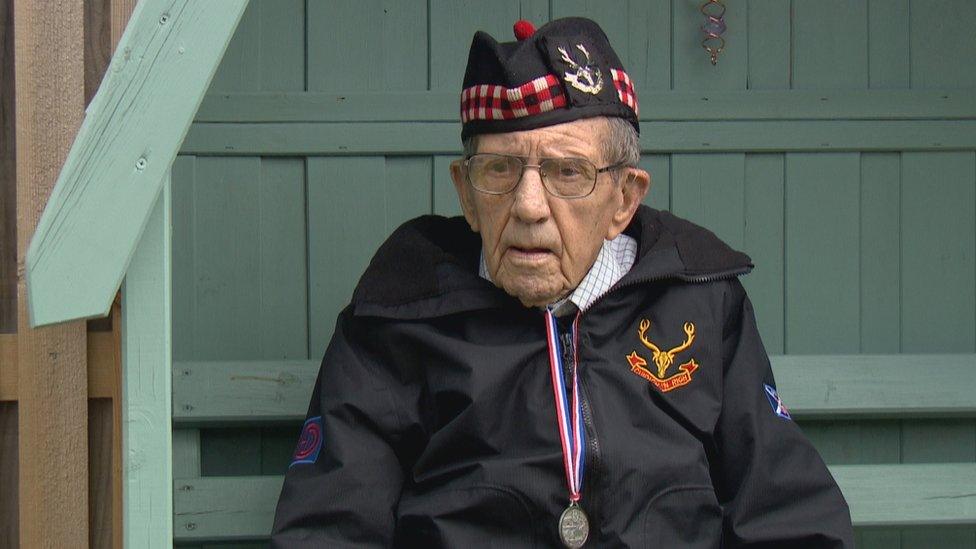The 99-year-old veteran of the 'forgotten Dunkirk'
- Published

Donald Smith was a teenager when he went to war
In June 1940, in the days after the successful mass evacuation at Dunkirk, more than 10,000 men fought a desperate last stand in a small French seaside town. Among them was teenage soldier Donald Smith.
Donald, who is now 99, was part of the 51st Highland Division who were left in France when Dunkirk was evacuated, and ordered to fight on against Hitler's war machine in the face of overwhelming odds.
The teenage soldier had grown up in Yorkshire but joined the Seaforth Highlanders, part of the Highland division, before the outbreak of World War Two.
He choose the Scottish battalion because of a family connection and his strong links to the country through his Glaswegian father.
Donald, who now lives in Forres in Moray, signed up with five friends and they completed their training at Fort George in the Highlands and Maryhill in Glasgow.
In January 1940, the division landed in France as part of the British Expeditionary Force (BEF).
In the months that followed, the BEF, along with elements of the French army, were pushed back to northern France by attacking German forces.
The Highland division became separated from the BEF and while hundreds of thousands of expeditionary soldiers headed for Dunkirk, the 51st was ordered to "hold the line" with the French army.
Over the course of a few days, almost 340,000 British and French troops were famously evacuated from the beach at Dunkirk.
The 51st, meanwhile, was fighting a losing battle.
"We knew nothing about Dunkirk," says Donald. "We never knew anything about it. All we were told was that we were moving back to northern France."

Donald Smith says he and his fellow soldiers were told nothing of the evacuation at Dunkirk
"We had been in a lot of skirmishes," recalls Donald. "But then we moved back to Abbeville where one of the biggest battles was. It was a battle to end all battles."
One of Donald's five friends was among those killed before the division, along with the French, were pushed back again.
"We were pushed back right along the Normandy coast. You would find along the way graves of the 51st," says Donald.
There were plans to evacuate the division but due to the advancing German forces, the options were narrowed to the small port of St Valery-en-Caux.
Donald's battalion reached the town of Veules-les-Roses, near St Valery.

Of his close friends who went to war, Donald was the only survivor
"We were marching down this road and suddenly across a field in the distance it was absolutely black with troops and tanks coming at us," he says.
"We had to dive for cover and we lay down with our packs in front of us, with our guns sticking out."
The soldiers were shelled by artillery and tanks. A high explosives shell burst above the heads of Donald and two of his friends.
His pals were killed and Donald was knocked unconscious by the explosion. He was severely injured by pieces of shrapnel.
"I woke up in a first aid tent," he says. "What a mess that was. I feel sorry for the medical staff. We (the wounded) were in a bad state, but those poor devils were up to their eyes in it."
"There were men lying on the floor on stretchers or just on a ground sheet."
Prisoners of war
It was decided Donald should be moved to a hospital in St Valery, which was by now on the brink of being occupied by German troops.
Two artillery gunners were tasked with carrying Donald to the hospital.
He says: "On the way into town German patrols were coming along the side streets, searching houses.
"There was an old bus at the side of the road with its windows broken and the two artillery lads put me inside, near the front, and they told me to stay there and they would come back for me.
"I must have dozed off or passed out again because the next thing there was a crash and a bang. I was the luckiest lad alive again as I looked round and saw the back end of the bus had blown out."
Donald staggered from the wreckage towards the harbour. Passing through a gate in a high wall he found himself at a house and in a garden with a pond, a fountain and the statue of an angel.
The owners of the property offered him shelter, but there was little respite for the young soldier. A tank crashed through the main entrance to the garden and German soldiers "poured in".

Remembering St Valery
The capture of 51st (Highland) Division following fighting at St Valery has been described as a "forgotten battle" of World War Two.
Its veterans, including Donald Smith believe the division was "sacrificed" to ensure the success of the evacuation at Dunkirk.
Events to mark the 80th anniversary have included pipers across Scotland performing a "doorstep tribute".
Poppy Scotland, external asked pipers and other musicians to play Heroes of St Valery at 10:00 on their doorsteps.
The music was written by Lewis-born pipe major Donald MacLean.
Prince Charles also took the salute from a piper at the prince's residence at Birkhall in Aberdeenshire to mark the anniversary.

'Old enough to fight you'
Following his capture, Donald caught a glimpse of what could have been.
While helped by two other prisoners of war (PoWs), he was marched to clifftops where he looked out over the English Channel and saw some ships that had been sent in an unsuccessful attempt to evacuate the 51st.
Donald was taken to a farmhouse where wounded PoWs were being given some medical treatment in a barn.
A senior German officer took an interest in the badly-injured Seaforth Highlander.
Donald says: "This big German top brass came up and he looked down at me and said: 'How old are you laddie?' in perfect English.
"'Old enough to fight you', I said back to him."
Between June and Christmas 1940, Donald found himself in a hospital in Paris and then a convalescence camp, which he described as being "terrible, with damp mattresses".
Once he had recovered from his wounds, he was moved to Stalag VIII-B Lamsdorf, a PoW in Poland.
He spent the rest of the war as a prisoner, before being liberated by US troops while on a months-long forced "death march" alongside retreating German soldiers.
Of his friends who joined the Seaforth Highlanders, Donald was the sole survivor.
"I get very emotional when I think of them," he says.
"They were true friends. To think I was the only one to come back is hard to describe unless you are in my shoes."